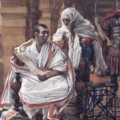
Reflecting on the Gospel Story
For a moment, put yourself in Jesus’ place during the time of the passion.
Take a few minutes to allow the variety of images to speak to you and imagine how it might all feel.

Lenten Studies - Week 6: “On the Cross”
Gospel text: Mark 15:20-39
Then they laid him out to crucify him. They compelled a passer-by, who was coming in from the country, to carry his cross; it was Simon of Cyrene, the father of Alexander and Rufus. Then they brought Jesus to the place called Golgotha (which means the place of a skull.) And they offered him wine mixed with myrrh; but he did not take it. And they crucified him, and divided his clothes among them, casting lots to decide what each should take.
It was nine o’clock in the morning when they crucified him. The inscription of the charge against him read, “The King of the Jews.” And with him they crucified two criminals, one on his right and one on his left. Those who passed by derided him, shaking their heads and saying, “Aha! You who would destroy the temple and build it in three days, save yourself; and come down from the cross!” In the same way the chief priests, along with the scribes, were also mocking him among themselves and saying, “He saved others; he cannot save himself Let the Messiah, the King of Israel, come down from the cross now, so that we may see and believe.” Those who were crucified with him also taunted him.
When it was noon, darkness came over the whole land until three in the afternoon. At three o’clock Jesus cried out with a loud voice, “Eloi, Eloi, lema sabachthani'?" which means, “My God, my God, why have you forsaken me?” When some of the bystanders heard it, they said, “Listen, he is calling for Elijah.” And someone ran, filled a sponge with sour wine, put it on a stick, and gave it to him to drink, saying, “Wait, let us see whether Elijah will come to take him down.”
Then Jesus gave a loud cry and breathed his last. And the curtain of the temple was torn in two, From top to bottom. Now when the centurion, who stood facing him, saw that in this way he breathed his last, he said, “Truly this man was God’s Son!”
Did Jesus have to die on the cross?
Could Jesus have avoided the cross? Could he have made a detour around Golgotha and returned to the quiet district of Galilee? Could he have avoided execution and settled for a quiet existence by the shores of the northern lake? Did his way of being human demand the cross?
It was not Jesus who looked for the cross; it was others in authority that looked to the cross as a way to eliminate him. It was not the idea of the Father: God the Father is not a sadist who planned the destruction of his beloved Son. In letting go of his Son, the Father had to be vulnerable to what would happen to his Son at the hands of others. All parents take that risk when they let go of their children. God the Father, no less, did likewise. One of my wise teachers, the Jesuit George McCauley, put it strongly when he wrote:
“We cannot have the Father ‘planning’ Jesus ’ death in any sense. If the
Father plans anything, it is that the Son share in solidarity our human condition. But this means that the Son takes on the mystery of human freedom, of lack of it. It means that in acting interacting, and being acted upon by others, the Son is surrounded by risk, coincidence, fate, windfall, surprise, accident, chance, chemistry and chaos. These things are intrinsic to our human lives. Jesus gets caught like the rest of us in the middle of crisscrossing human freedoms.
He did not die, we must keep repeating to ourselves. He was killed, put to death, done in. His death was not something to be embraced with some subtle joy. To be unsheathed of our body in one tearing, terrifying wrench is an awful thing no matter who it happens to be, no matter what sentiments accompany the event His death, like ours, remains the stinking grief-ridden, crushing thing that all death is. Let's try not to dignify it by having the Father plan it. ”
Love did not demand the cross, but in the life of Jesus love ends up on the cross. That is what actually happened. That is, often, what continues to happen to self-forgetful love. Love chooses not to avoid the suffering that emerges from its commitment. The avoidance of suffering is not love’s governing passion; it cannot be.
Jesus could have avoided going to Jerusalem; he could have taken the advice of the disciples who warned him about the fate that would surely befall him there. But instead of avoiding Jerusalem, Jesus enters the city - publicly and loudly. He does not disguise himself and slip through a quiet gate; he heads a parade. And the parade ends up as another journey to the place of dying. This journey he endures to the end.
Jesus decides to confront the power that is set against him. And when he chooses 'to do that, like all people who confront oppression, he makes suffering visible. As Theodor Adorno noted: “It is part of the mechanism of domination, to forbid recognition of the suffering it produces.”
The memory of Jesus is dominated by the cross; when Jesus was at his most vulnerable. It is by his wounds that we are healed-not by his cleverness or ability or power. By his wounds. We are healed not by the strength of Jesus but by his brokenness. That is why the cross, not the tomb, has dominated as the iconic image associated with Jesus, one that has lasted down the centuries.



The sign of the cross
The cross of Jesus stands at the centre of the Christian story as the sign of the lengths love will go to in its passion for others.
The cross is lifted up in the midst of the Christian community as a sign that someone thought we were worth all the pain and the suffering.
The love of one who “did not cling to his equality with God but emptied himself’ to become as we all are; and, as we are, to show us that in spite of our stupidities and madness, God loves us.
All else is commentary.
Journeying with Jesus
Following the new Companion Guide written for groups: by Father Denis McBride















































There is nobility and dignity, yes, but it is not a scene of triumph - if you stay with it, inside it, feel it in your bones, without peeking ahead at the resurrection. It is an end-game. It certainly was for those who were there, for those who were left behind. Bereft. There were no alleluias on Golgotha.
Yet, yet, yet: something is made manifest - as the poet Seamus Heaney observed, in this excerpt from his poem, “Weighing In”.
And this is all the good tidings amount to:
The principle of bearing, bearing up
And bearing out, just having to
Balance the intolerable in others
Against our own having to abide
Whatever we’ve settled for and settled into
Against our better judgement. Passive
Suffering makes the world go round...
Prophesy who struck thee! When soldiers mocked
Blindfolded Jesus and he didn’t strike back
They were neither shamed nor edified, although
Something was made manifest - the power
Of power not exercised, of hope inferred
By the powerless forever.
“The power of power not exercised” summarises the beauty of this scene. In the wilderness Satan tempted Jesus with the kingdoms of the world, and Jesus refused the offer of such spectacular power, deciding to tread the ordinary toad of powerlessness, a road that led him, inexorably, to the cross. He has to pay the bill for the kind of life he chose to live, for the kind of people he chose to stand beside, for his way of being human.
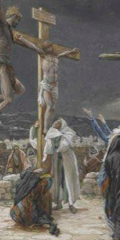

Summary
As an exercise in putting yourself in Jesus’ sandals in his final hours, it is a worthwhile exercise to meditate on the passion as if you were the central character and journey through the moments of the story. How does lit feel to have all this happen to you? How does it feel to have all these people make decisions about you over which you have no control?
As you watch Jesus choose to go through this time of terror, you realise that the love within him is stronger than any wish to survived. From the cross, it is love’s wordless language that speaks to us.
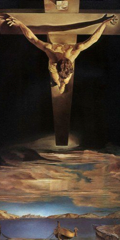
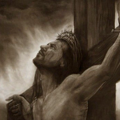

Prayer
Blessed are you, O Lord almighty,
who illumine the day with the brightness of
the sun and delight the night with the glow of fire,
who has made us worthy to live through this whole day
and come close to the reaches of the night.
Hear our prayers and those of all your people;
forgive us our sins, both deliberate and
non intended and accept our petitions;
Send down upon your inheritance
the riches of your mercy and compassion;
surround us with your holy angels;
cover us with the armour of your justice;
keep us in the ways of your goodness;
protect us with your power against any harm
or conspiracy of the devil;
grant us that this evening and the
approaching night,
and all the days of our life,
may be perfect, holy, peaceful, without sin,
without stumbling or vain imagination;
through the intercession of the Mother of God
and of all the saints;
who ever pleased you since time began.
Amen

The Orthodox Liturgy
Final Prayer and Blessing
We pray for all who suffer
in the cause of right,
for those who give their lives for a purpose
larger than their own safety and survival.
That their generosity of spirit
might meet its own reward
in the fullness of everlasting life.
We pray for those who are afflicted
by an unexpected death;
for those whose lives are
cut short by accident;
for those who are killed through violence or
terror or war;
for all who die out of due season.
That the Lord of all mercies
will make good their loss in this life
and gladden them with the glory of heaven.
We pray for those who mourn the loss
of those they have loved long and well.
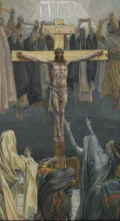

A View of the Crucifixion: Pilate’s Wife
Please click here to read Father Denis McBride’s poem.
